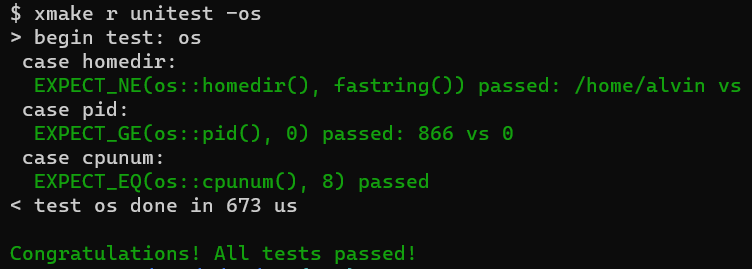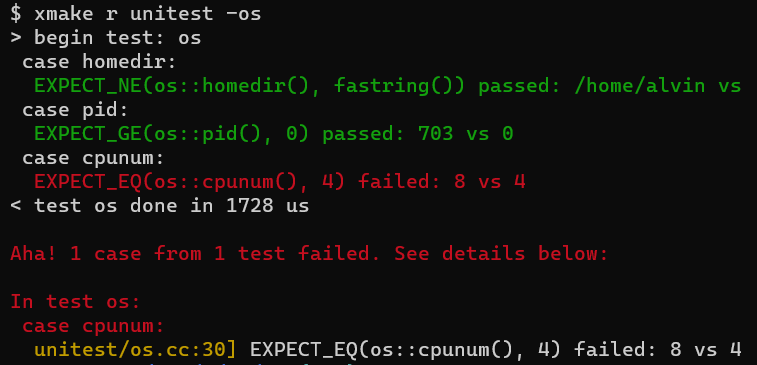include: co/unitest.h.
#Basic concepts
co.unitest is a unit testing framework, similar to google gtest, but easier to use.
#Test Units and Test Cases
A test program can be divided into multiple test units according to functions or modules, and there can be multiple test cases under each test unit. For example, a test unit can be defined for a class (or module) in C++, and a test case can be defined for each method in the class (or module).
DEF_test(test_name) {
DEF_case(a) {
// write test code here
}
DEF_case(b) {
// write test code here
}
}
In the above example, DEF_test defines a test unit (actually defines a function), and DEF_case defines the test case, a test case is actually a code block in the function.
#DEF_test
#define DEF_test(_name_) \
DEF_bool(_name_, false, "enable this test if true"); \
... \
void _co_ut_##_name_(unitest::xx::Test& _t_)
- The
DEF_testmacro is used to define a test unit, and the parameter_name_is the name of the test unit. - The first line of the macro defines a bool flag, which is the switch of the test unit. For example,
DEF_test(os)defines a test unit os, and we can use-osin command line to enable test cases in this unit. - The last line of the macro defines the function corresponding to the test unit.
#DEF_case
#define DEF_case(name) \
_t_.c = #name; \
cout << " case " << #name << ':' << endl;
- The
DEF_casemacro is used to define a test case in the test unit. The parameternameis the name of the test case. It must be used inside the function defined byDEF_test. - The name of a test unit must be albe to use as part of the class name or variable name. The test case name does not have this restriction. For example,
DEF_case(sched.Copool)is also reasonable. - The code of the test case is generally enclosed by a pair of curly braces to isolate it from other test cases.
- DEF_test may not contain any DEF_case. In this case,
co.unitestwill create a default test case.
#EXPECT assertion
#define EXPECT(x) ...
#define EXPECT_EQ(x, y) EXPECT_OP(x, y, ==, "EQ")
#define EXPECT_NE(x, y) EXPECT_OP(x, y, !=, "NE")
#define EXPECT_GE(x, y) EXPECT_OP(x, y, >=, "GE")
#define EXPECT_LE(x, y) EXPECT_OP(x, y, <=, "LE")
#define EXPECT_GT(x, y) EXPECT_OP(x, y, >, "GT")
#define EXPECT_LT(x, y) EXPECT_OP(x, y, <, "LT")
EXPECTasserts thatxis true, and x can be any expression with a value of type bool.EXPECT_EQassertsx == y.EXPECT_NEassertsx != y.EXPECT_GEasserts thatx >= y.EXPECT_LEasserts thatx <= y.EXPECT_GTasserts thatx > y.EXPECT_LTasserts thatx < y.- When defining a test case with
DEF_case, you can use these macro assertions. If an assertion fails, it means that the test case fails. The terminal will print related error messages in red color.
#Write test code
#Test code example
#include "co/unitest.h"
#include "co/os.h"
DEF_test(os) {
DEF_case(homedir) {
EXPECT_NE(os::homedir(), "");
}
DEF_case(pid) {
EXPECT_GE(os::pid(), 0);
}
DEF_case(cpunum) {
EXPECT_GT(os::cpunum(), 0);
}
}
int main(int argc, char** argv) {
flag::parse(argc, argv);
unitest::run_tests();
return 0;
}
- The above code defines a test unit named os, and os has 3 test cases.
- When running the test program, you can use
-osin the command line to enable this unit test. - In the main function, you need call
flag::parse()to parse the command line parameters, and then call therun_tests()method provided byco.unitestto run the unit test code.
#Default test case
DEF_test(os) {
EXPECT_NE(os::homedir(), "");
EXPECT_GE(os::pid(), 0);
EXPECT_GT(os::cpunum(), 0);
}
- The above code does not contain any DEF_case,
co.unitestwill create a default test case nameddefault. - For more complex test codes, it is generally not recommended to use the default test cases. It is better to divide them into different cases so that the code looks clearer.
#Build and run the test program
#Build the unitest code
xmake -b unitest
- Run the above command in the root directory of coost to compile the unit test code in co/unitest and generate the
unitestbinary program .
#Run all test cases
xmake r unitest
- Run all test cases by default.
#Run test cases in specified test units
# Run only test cases in the os test unit
xmake r unitest -os
# Run test cases in the os or json test units
xmake r unitest -os -json
#Test result example
- All tests passed

- Test case failed
